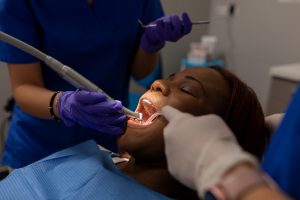Information Library
Start Reading

Oral health disparities are a serious public health issue affecting millions of people in the United States. Advances in dental science and technology continue, but different population groups, including in and around Southeastern Pennsylvania, experience an unequal distribution of positive oral health outcomes.
At Penn Dental Medicine (PDM), we’re helping improve oral health and also public health by expanding access to advanced, affordable care. Find out how disparities in oral health affect different populations and what we’re doing to reduce these disparities’ harmful impacts.
Good oral health is essential for everyone. But some populations are particularly vulnerable to oral health disparities.
Low-income households often lack dental insurance, and many individuals state they can’t afford preventative services. In Southeastern Pennsylvania, the cost of services remains “the most significant barrier” to dental care, even among Medicaid enrollees, according to the American Dental Association’s Health Policy Institute. The situation is made worse by a shortage of dental health professionals in several southeastern counties.
This lack of access to low-income dental care can lead to untreated tooth decay, gum disease, tooth loss, and other chronic oral health conditions.

Systemic discrimination and bias against members of racial and ethnic minorities can be obstacles to oral health care. Many of these individuals may avoid seeking care altogether, leading to poorer oral health over time.
According to the CareQuest Institute for Oral Health, a PDM policy partner:
People in the LGBTQ+ community can face discrimination and bias from medical professionals, as well as concerns about confidentiality. Such factors can create fear and mistrust, leading them to avoid necessary care rather than seek an LGTBQ+ dentist.

According to CareQuest, LGBTQ+ individuals are:
Households in which members have physical, intellectual, and developmental disabilities often face frustrating difficulties when trying to secure oral health care.

According to CareQuest, people in households experiencing disabilities:
Research reveals links between oral health and mental health, particularly depression.
For all these populations, oral health disparities can have profound, far-reaching consequences. Poor oral health can lead to discomfort, pain, and difficulty eating and speaking. These physical effects can, in turn, contribute to low self-esteem, social isolation, and a reduced capacity to work or participate in society.
Oral health problems are also associated with chronic diseases such as diabetes, heart disease, and stroke, further compounding oral health disparities’ negative impact.
Oral health disparities are complex and demand multifaceted solutions, but dental professionals have a key role to play.
At PDM, we take this role seriously. We offer comprehensive, affordable dental care services accessible to everyone, including individuals with disabilities and special needs.
Our student dentists, closely supervised by experienced dentists, are trained to address individuals’ oral health needs regardless of differences and distinctions met by discrimination elsewhere.
And PDM works with patients of all socioeconomic statuses. As an educational dental clinic, our services cost 50%-70% less than at private practices. We work with patients to establish workable financing and payment plans. And we offer low-income dental care at our PHMC Public Health Campus on Cedar.
To find out more about how PDM is committed to equity of oral health care for everyone, download our free eBook, Dental Work Without the Stress.